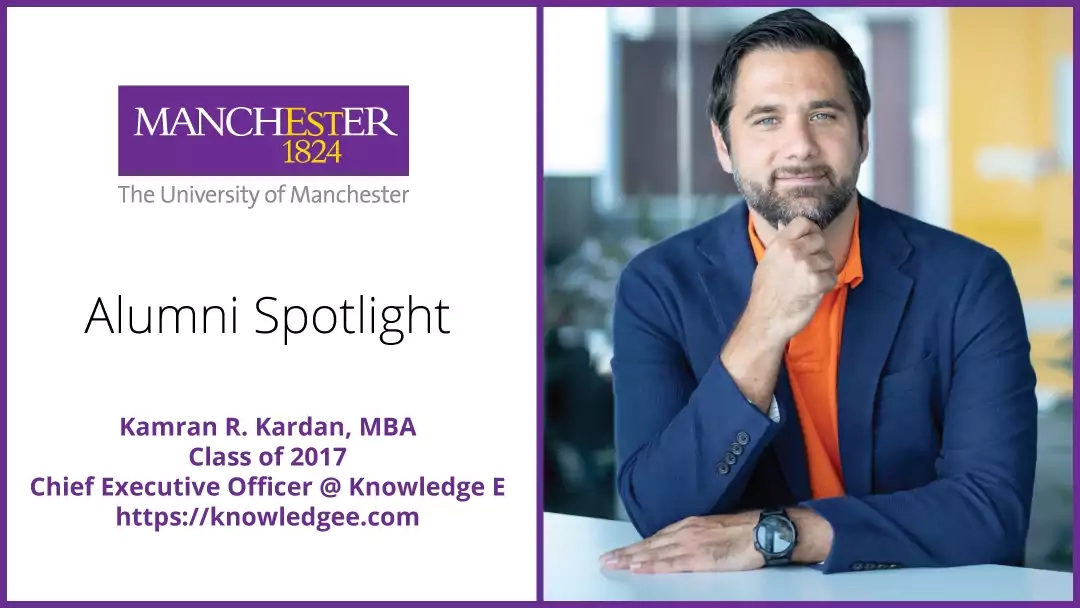
University of Manchester alumnus, Kamran R. Kardan, MBA, is the CEO of ‘Knowledge E’, which he founded in 2012 in Dubai, UAE, as a provider of expertise, information resources and software solutions. Knowledge E connects the global community of knowledge creators and seekers - researchers and education providers and users worldwide. The company’s services span digital library solutions, training programmes, consulting projects and publishing services. It may be a small company but it has a big mission – to create a more knowledgeable world.
This includes the company’s ‘Zendy’ online platform which creates access to academic literature with high-quality and relevant academic content. Typically, online scholarly libraries lie behind paywalls or require university facilitated access, which creates barriers for many people, especially in lower income countries. Zendy meets the demand for knowledge for everyone and is collaborating with researchers, students, institutions and publishers. The platform is already available in five countries - Algeria, Jordan, Morocco, Tunisia, and the UAE - with more countries in Africa to follow during the remainder of 2020. It already offers more than 120,000 scientific publications covering all the major disciplines, including top titles such as Science, Harvard Business Review, and others.
Navigating the pandemic
Knowledge E was set up as a digital enterprise and has operated online since day one, so the team was in a strong position to withstand the physical distancing and other barriers created in response to the impact of the pandemic. Much of the company’s operations and services, such as its digital library and online content, continued uninterrupted and the only significant change was to the delivery of the workshops, which transitioned online. Ironically, this included a webinar on how to transition to online teaching in higher education, which attracted 720 participants from more than 45 countries.
The entire team at Knowledge E has stayed together and adapted to ‘work from home’. The swift reaction to the situation has ensured that the company has been able to focus on virtualising events and prioritising online services, recognising that the pandemic is not just going to go away suddenly.
As Kamran explains, there was no ‘Zoom effect’ but a sustained level of interest and flow of enquiries about services, with signs for positive future growth. It was enough encouragement to accelerate development plans.
“The positive impact of the pandemic has moved our plans along and we are accelerating the development of a unique digital capacity building solution for researchers and working professionals, focusing on boosting commercialisation and innovation efforts of academia, governments and corporations. This was always part of our plan but with the shift to a virtual life and workplace, the world has moved closer to us and the timing was right.”
In a time when research and information is becoming increasingly noticed and valued, Knowledge E is determined to focus on services that meet the needs of society. The company is taking a ‘Spotify’ approach to online publishing for academic content – with full access to library books, papers and articles for a flat monthly fee.
“We see the need for an affordable digital library providing access to reliable scientific content. The content on the Zendy platform is mainly peer reviewed and accessible to those who need high quality information, such as doctors and nurses, working professionals, and for other researchers who are building knowledge. Very simply, the Zendy platform is part of our mission to create a more knowledgeable world. We are making progress with our services to institutions, researchers, and with our training programmes; now, we are addressing more consumer needs and helping individuals get access to high quality information to make more informed decisions, while supporting studies and research.” Kamran notes that the time of the pandemic has heralded the return of experts and scientists, with more people now more inclined to listen to expert voices. Knowledge is power and it helps people solve problems and collaborate. The aim is to connect knowledge creators and seekers and the current pandemic has been a trigger in bringing people together, with scientific experts more visible and audible, supported by research.
“The threat of the pandemic is raising interest in the quality of scientific information available and questions about sources. It is also creating greater awareness in other global threats such as environmental change. People are now looking for the data and evidence behind information and the news they consume and Zendy is a platform that will help remove barriers to information and democratise access to research.”
There is arguably a broader and growing culture of learning, with working from home creating more time for personal development and learning. “There is only so much Netflix people can consume and more people now have more time to read and learn. We aim to bring people together on a neutral and added value platform, so we are adding more publishers – two of the big five scientific publishers have so far joined, we are adding a third with more publishers to follow – with the aim of creating more, easy access to more researchers.”
Knowledge E is working with the scientific community to support scholarly communication. For example, the company has just issued a call for papers for the Arab Journal of Nutrition and Exercise for a special issue on Nutritional and Functional Wellbeing during COVID-19. So, the team is helping to provide a global platform and an international showcase for local and regional research practitioners.
“We are in a position to contribute and fortunate to be here to make a difference.
“Knowledge E changed my life” is a real end user quote that highlights the value of what we do and we are always looking for new ways to contribute to society. Looking ahead, we have lots of ideas that we need to prioritise. We have seen music, books and entertainment make the shift to digital subscriber models, so why not academia? Our aim is to bring this to the world through platforms such as Zendy.”

